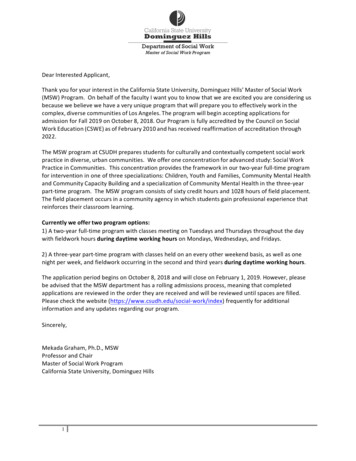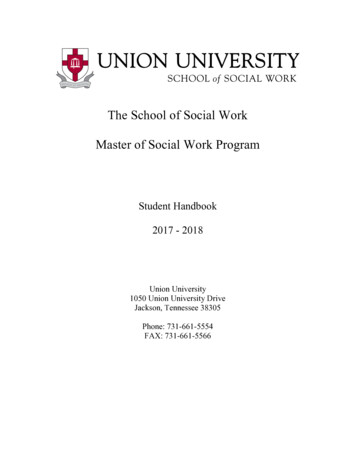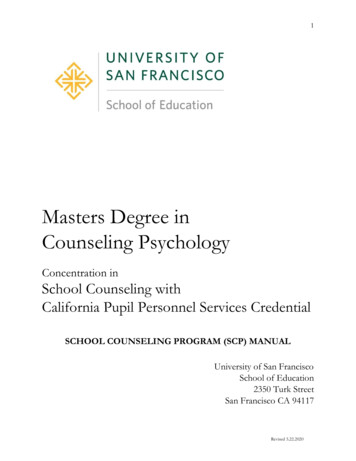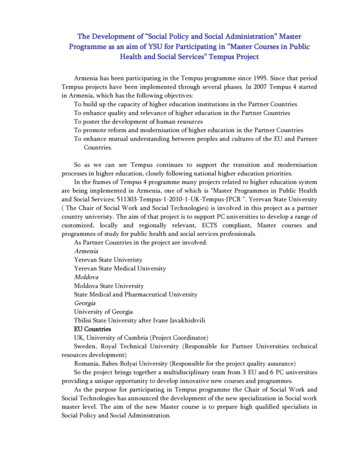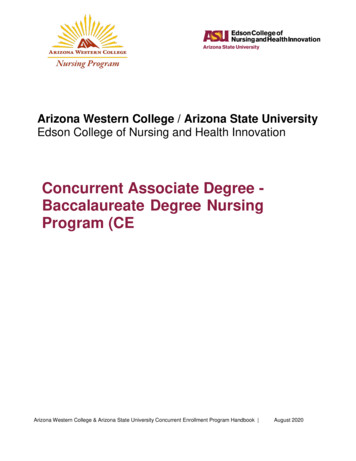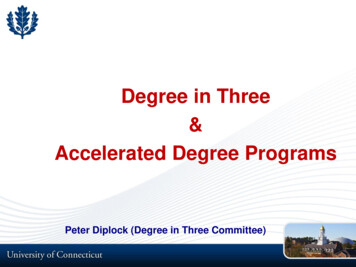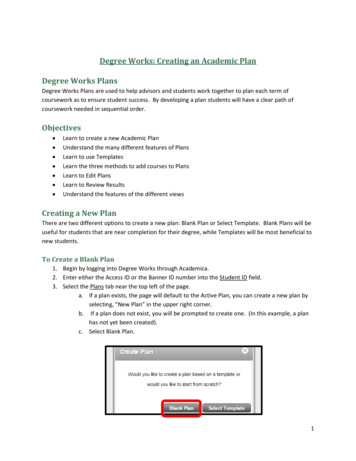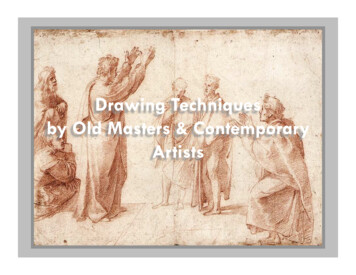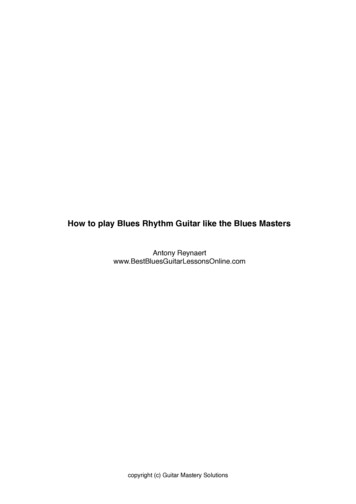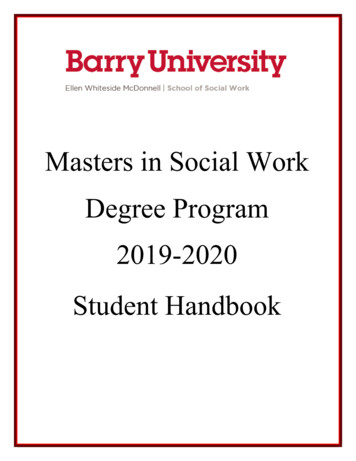
Transcription
Masters in Social WorkDegree Program2019-2020Student Handbook
KNOWLEDGE TRUTH SERVICE SOCIAL JUSTICE1
PROGRAMLOCATIONSMIAMI SHORES CAMPUS11300 NE Second Avenue Miami Shores, Florida33161305-899-3900 (Telephone)1-800-756-6000 (Toll Free)305-899-3934 (Fax) PALM BEACH/ TREASURECOAST9123 N. Military Trail Suite 200Palm Beach Gardens, Florida 33410561-622-2732 (Telephone)561-622-0158 (Fax)22
PLEASE VISIT OUR WEBSITEAT:www.barry.edu/mswBARRY UNIVERSITY SCHOOLOF SOCIAL WORKMSW STUDENT HANDBOOK2019 – 2020TABLE OF CONTENTSWelcome from the DeanGuiding PrinciplesAdministrative OrganizationFaculty & Staff RosterBarry University MissionBarry University Core CommitmentsBrief History of Barry University School of Social WorkThe Mission of Barry University School of Social WorkThe Mission of MSW ProgramLife Experience Credits67811121213131414GENERAL PROCEDURESRegistrationAcademic Degree PlanRegistration Procedure151515TUITION, FEES AND FINANCIAL AID17ACADEMIC INFORMATIONWithdrawal PoliciesTemporary WithdrawalMedical Withdrawal from the UniversityDropping/Adding a CourseRefund PolicyMatriculation RequirementsGraduation RequirementsDean’s Honor ListGradingStudent Evaluation of BUSSW ProcessProfessional Behavior & Decorum of Social Work StudentsAttendance3192021212122232425292930
Hurricane and Other Natural DisastersDress CodeAcademic Mentorship & Advisement313131GUIDING PRINCIPLESCore Performance StandardsGuidelines for Complaints & Grievance ProceduresAcademic Integrity Policy and PlagiarismProfessional DevelopmentAPA Style RequirementsStatement on Cultural DiversityStatement of Non-DiscriminationSocial Work Statement on Human RightsStatement on Sexual HarassmentTitle IX OfficialsPolicy on WeaponsPolicy on Student RecordsPolicy on Utilization of Social MediaException to School PoliciesRevisions of School Polices323235363737373838383838394040MSW DEGREE PROGRAMCurriculum DescriptionFoundation CurriculumConcentration CurriculumFocused Practice CoursesField Education4040414142SCHOOL RESOURCES AND ACTIVITIESStudent ParticipationStudent ActivitiesCenter for Human Rights & Social JusticeJack Riley Social Work Student CenterSchool of Social Work Student AssociationProfessional SupportLicensing SupportFellowship FundAlumni InvolvementProfessional Organizations42434344444445454646UNIVERSITY RESOURCES FOR STUDENTSAcademic ResourcesComputer LabBookstore4848484
Campus MinistryCareer Development CenterCenter for Counseling and Psychological ServicesOffice of Accessibility ServicesCourse Substitution PolicyHealth CoverageHousingThe Learning CenterLibraryParkingStudent IDSports Activities494950505151525252535353APPENDIX A: ACADEMIC CALENDAR55APPENDIX B: MSW DEGREE PLAN55APPENDIXC: NASWCODE OF ETHICS56APPENDIX D: ELECTRONIC ACCESS INSTRUCTIONS57APPENDIX E: ELECTRONIC FORMS59Exception to PolicyGrade Appeal FormStudent Grievance FormFellowship Fund Application60646566NASW-LEAD 2019 – Tallahassee, Florida5
WELCOME FROM THE DEANSchool of Social WorkDear Entering MSW Student:Welcome to Barry University School of Social Work.We are delighted that you have selected Barry for yourgraduate education. We take great pride in our Schooland, this year, we celebrate our 50 year anniversary ofexcellence in social work education.Over the years, we have kept pace with the demands ofour profession and the dynamic social, political, andeconomic conditions that impact the most vulnerable ofour global society. Most recently, we made theparadigm shift from the most traditional social workcurriculum to a trauma-informed prospectus, providingyou with the most advanced and contemporary knowledge in social work education. We wantto make sure you have an engaging experience with us as you grow and learn in an environmentthat is student-centered and focused on your professional development. We want you to be oneof the more than 5,000 graduates who are using their knowledge and skills to build a bettersociety.Knowing the fundamental principles of the school, the expectations, policies and proceduresthat guide the activities of the school, is a critical building block. This Student Handbook hasbeen designed to ensure you have the information you need to navigate within the school anduniversity and be successful in your efforts. Please take the time to review this materialcarefully. If you have questions or require additional information please visit our Office ofStudent Services in Powers Hall Room 126 for information, guidance and any support youmay need.Your engagement in school governance, our Center for Human Rights and Social Justice, andyour participation in activities that extend your leadership skills, research knowledge, andenriches your passion are welcomed. We wish you much success. We are here to celebrate youbecoming a voice of change.Respectfully,Phyllis F. Scott, PhD.Dean6
GUIDING PRINCIPLESThe guidelines and administrative determinations contained in the Barry University School ofSocial Work Student Handbook are rooted in the belief that we have a responsibility tograduate students that demonstrate and emulate professional conduct, professional ethics, andpractice competency.These guiding principles are the infrastructure that frame expectations mandated of ourstudents throughout their tenure at the School of Social Work. From the application process tograduation, these guiding principles are the barometer by which implicit and explicitcurriculum is demonstrated.The elements of the guiding principles are framed within the Core Performance Standards andthey are:Professional EthicsIndividual judgment and conduct is consistent with established laws and the values andethics of the social work profession as set forth in the NASW Code of EthicsCritical thinkingIndividual reasoning reflects a comprehensive analysis that distinguishes fact frominference; an individual’s conclusions and assigned meanings are grounded in relevantdata, information and evidence.Task managementEffective task/time management strategies guide all professional and academicresponsibilities and activities.Self-awarenessA commitment to the process of self-reflection and self-critique assuming fullresponsibility to protect peers, colleagues, research participants, clients and others fromthe adverse consequences of personal performance problems and behaviors.Professional relationshipsAll professional interactions reflect respect, integrity, honesty, cooperation andcollaboration as well as a clear understanding of professional role, authority andappropriate boundaries.CommunicationAll verbal, non-verbal and written exchange of information between self, clients,faculty, university personnel, and colleagues are in accordance with established lawsand professional standards.7
ADMINISTRATIVE ORGANIZATION305-899-3916o DeanPhyllis F. Scott, PhD.o Associate Dean305-899-3196o Director, MSW Program305-899-3925Director, Ph.D. Program305-899-3920Maria Teahan, Ph.D, ACSW, LCSWTodd Tedrow, LCSW, CAPSW Sharron Singleton, DSW 305-899-3941Director, BSW ProgramAshley Wright, MSW8
305-899-4765Director, GraduateAdmissions-SSWKristy Vega, BSW 305-899-3930Director of Field EducationSarah-Ingram-Herring, Ph.D., LCSW 305-899-3935Associate Director of Field EducationAyanna Mack, MHA Associate Director of Field Education561-622-2732 Manager of Operations305-899-3937Annette Cardoza-McNeal, MBA 305-899-3906Administrative Assistant-Field EducationMiami ShoresSheryl Sullivan9
305-899-3903Assistant to the DeanConstance Johnson 305-899-3907Student Services CoordinatorStephanie Theile 305-899-3672Marketing CoordinatorLaura Bello-Conte 561-622-2732Administrative AssistantPalm Beach/Treasure CoastLili Lolo Executive Director, Office of the Public Guardian954-862-3655Eloisa Ramos, LCSW, NCG Coordinator, Center for Human Rights & Social JusticeCarolina Rios, MA10305-899-3047
FACULTY/STAFF ROSTER2019-2020Faculty and staff biographies, contact information and photographs are available on the School’swebsite at: https://www.barry.edu/social-work/faculty11
BARRY UNIVERSITY MISSIONMISSION STATEMENTBarry University is a Catholic institution of higher education founded in 1940 by the AdrianDominican Sisters. Grounded in the liberal arts tradition, Barry University is a scholarlycommunity committed to the highest academic standards in undergraduate, graduate andprofessional education.In the Catholic intellectual tradition,integration of study, reflection andaction inform the intellectual life.Faithful to this tradition, a Barryeducation and university experiencefoster individual and communaltransformation where learning leads toknowledge and truth, reflection leadsto informed action, and a commitmentto social justice leads to collaborativeservice.Barry University provides opportunities for affirming our Catholic identity, Dominican heritage,and collegiate traditions. Catholic beliefs and values are enriched by ecumenical and interfaithdialog. Through worship and ritual, we celebrate our religious identity while remaining aUniversity community where all are welcome.BARRY UNIVERSITY CORE COMMITMENTSCatholic intellectual and religious traditions guide us in the fulfillment of our mission. The missionand values of the Adrian Dominican Sisters serve as the inspiration for our core commitments.KNOWLEDGE AND TRUTHBarry promotes and supports the intellectual life, emphasizing life-long learning, growth anddevelopment. The University pursues scholarly and critical analysis of fundamental questions ofthe human experience. In the pursuit of truth, the University advances development of solutionsthat promote the common good and a more humane and just society.INCLUSIVE COMMUNITYBarry is a global, inclusive community characterized by interdependence, dignity and equality,compassion and respect for self and others. Embracing a global world view, the University nurturesand values cultural, social and intellectual diversity, and welcomes faculty, staff, and students ofall faith traditions.12
SOCIAL JUSTICEBarry expects all members of our community to accept social responsibility to foster peace andnonviolence, to strive for equality, to recognize the sacredness of Earth, and to engage inmeaningful efforts toward social change. The University promotes social justice through teaching,research and service.COLLABORATIVE SERVICEBarry is committed to serving local and global communities through collaborative and mutuallyproductive partnerships. The University accepts responsibility to engage with communities topursue systemic, self-sustaining solutions to human, social, economic and environmentalproblems.BRIEF HISTORY OF BARRY UNIVERSITYSCHOOL OF SOCIAL WORKThe socio-cultural revolution of the 1960s created a shift in beliefs and values which impacted localand global infrastructures on a multi-dimensional level. Barry University’s founders, the AdrianDominican Sisters, challenged these exploitative and dehumanizing practices by confronting systemsthat denied basic human rights. The injustices suffered by many vulnerable and marginalizedpopulations could no longer be denied; the need for individuals who would strive to promote socialjustice and bio-psycho-social-spiritual-political change was necessary.Thus, twenty years after the founding of Barry University, the local community upheaval andsocial unrest in the mid-1960s prompted Barry University to consider ways it might advance socialjustice and individual well-being through professionally trained social workers. In 1966, BarryUniversity established the first graduate social work program in south Florida. Today, this socialwork program is recognized as an important participant in the University’s scholarly community.THE MISSION OF THE SCHOOL OF SOCIAL WORKThe mission of the Barry University School of Social Work is framed by the core values, ethics,and commitments of the social work profession and Barry University mission. Within a culturallydiverse framework, the School of Social Work is committed to educating social workers forprofessional social work practice that is informed by context and characterized by competence,skills of leadership, quality, the quest for social and economic justice in local and globalcommunities and dedication to continuous professional growth and development.13
THE MISSION OF THE MSW PROGRAMWithin the context of the Barry University School of Social Work mission, the MSW program iscommitted to educating advanced clinical practitioners within a trauma-informed, resiliencyframework. The MSW Program is committed to advancing students as local and global leadersand advocates for social and economic justice with emphasis on academic excellence, culturaldiversity, ethical practice and community engagement.LIFE EXPERIENCE CREDITSIn keeping with CSWE standards, the School of Social Work cannot grant academic credit forlife experience or previous work experience, in whole or in part, in lieu of the field internship orany courses in the curriculum.14
GENERAL PROCEDURESREGISTRATIONThe School attempts to register students early enough that they can plan for the investment of timeand money that is required to pursue graduate social work education. The MSW Programcurriculum is organized around the status of a student’s admission (part time/full time - 63 creditor 32 credit), the semester the student is admitted (fall, spring, summer), and the matriculationrequirements of the School.ACADEMIC DEGREE PLAN The School’s Master Degree Course Plan guides the matriculation of studentsand represents the curricular structure of the school’s accelerated program. It offers a year-round, highly concentrated plan of study that prescribes theorder that courses are offered each semester. The individualized course plans are developed by the Director of the MSWProgram and Student Services prior to registration. They are formulated in theSchool of Social Work InPlace records systems and can be retrieved by thestudent at any time. Course plans and student’s financial status must be reviewed at the time ofregistration. Students are required to follow the Master Degree Course Plan and anyvariation of this plan requires an Exception to Policy. The Exception to Policy must be completed by the student, submitted to his/herAcademic Advisor/Faculty Mentor and approved by the Director of the MSWProgram and Student Services.REGISTRATION PROCEDUREOnline registration for new students is made available prior to the start of the enrolled semester.Late registration for all new students is conducted immediately following new student orientation.Online registration is scheduled in advance of the enrolling semester. Continuing students,(students who are already enrolled in the program) register in the fall semester for the springsemester and register in the spring semester, for the summer and fall semesters.To register, students currently enrolled in the MSW Program must:1. Schedule an appointment with assigned Academic Advisor/Faculty Mentor prior to registrationto review and modify, if necessary, the student’s course plan. Students are not able to registeronline without the online pre-registration approval of the Academic Advisor/Faculty Mentor.2. If the student course plan requires a modification that variates from the Master DegreePlan, the student must, along with his/her Academic Advisor/Faculty Mentor, complete an“Exception to Policy” form. This Exception to Policy must be approved by the Director of theMSW Program and Student Services prior to the student registering for any class. A new, revisedcourse plan must be uploaded into InPlace Records.15
3. The student may then register online for courses. The Office of Student Services also providesmanual registration assistance for students across all MSW campus sites.4. Credit for field education courses is granted only upon the successful completion of all FieldEducation course requirements and demonstrated achievement of the educational objectives.5. Class sections will be closed based on enrollment count. As class sections reach enrollmentcount, the section will be automatically closed. Students will then be enrolled in the next classsection of that course.Note: Students will not be able to register if the following issues exist: If the student owes more than 500.00 in feesIf there are any restrictions or “holds” on your accountIf the student has not updated their Student Profile on WebAdvisorPlease note: If the student’s degree plan has been altered due to transfer credits, waived credits, ordue to previous decisions made by the student, please contact the Director of the MSW Program andStudent Services. Every attempt is made by the School to enroll students in preferred course sections. Weencourage students to register as far enough in advance as possible to facilitate the timelyscheduling of work, family, or other commitments. It is therefore extremely important thatstudents note the registration periods in the School of Social Work academic calendar, andthat students register during those time frames. When this is not possible, please consultwith your Academic Advisor/Mentor.16
TUITION, FEES AND FINANCIAL AIDFINANCIAL AID PROBATION DUE TO LOW GPABarry University, in compliance with 2011 changed federal regulations, has established thefollowing standards of academic progress (SAP) that must be met to receive federal financial aid.To maintain financial aid eligibility, a student must be making satisfactory progress towards adegree. Satisfactory progress is determined in both a qualitative and a pace measurementQualitative component: (cumulative grade point average)All Barry University students must meetand maintain the cumulative grade pointaverage (GPA) required by the universityfor continued eligibility to enroll andgraduate.Graduate and doctoral students mustcomplete their degree program withinseven years from the time they areadmitted to their respective graduate degreeprogram. All periods of enrollment must be considered. Once the maximum time frame has beenreached, the student will no longer be eligible for financial aid.Understanding Satisfactory Progress:Attempted Credit HoursAttempted credit hours are credit hours enrolled after the end of the add/drop period. Credithours dropped during the add/drop period are not included in calculating the attempted hours.Incomplete Grades, Missing Grades, WithdrawalsIncomplete grades, missing grades, failing grades and withdrawals after the add/drop period areconsidered as not earned credit hours in calculating the number of credit hours completed.Transfer Credit HoursTransfer credit hours do not count toward making up shortages in earned credit hours for thecompletion ratio.Satisfactory Academic Progress ReviewThe Financial Aid Office will review satisfactory academic progress for financial aid recipientsat the end of each semester. This policy is applicable to all undergraduate, graduate and doctoralstudents receiving federal financial aid.If a student is not making satisfactory academic progress at the end of a semester, the studentwill be notified in writing and placed on financial aid warning for one semester. Federal aid willbe disbursed for the following semester, but at the end of that semester, the Financial Aid Office17
will review the student academic record and termination actions will be taken if satisfactoryacademic progress has not been met. If federal student aid is terminated, notification will be sentconcerning the appeal process.Warning StatusThe first time a student does not meet the required completion or cumulative grade point average,the student will be placed on financial aid warning. The student will retain federal financial aideligibility.Termination StatusThe student will not be eligible to receive any federal or institutional financial aid, even if thestudent is permitted to continue enrollment at Barry University.Regaining Eligibility After Financial Aid TerminationPlease note that a warning statu
In 1966, Barry University established the first graduate social work program in south Florida. Today, this social work program is recognized as an important participant in the University’s scholarly community. THE MISSION OF THE SCHOOL OF SOCIAL WORK . The mission of the Barry University Sc
